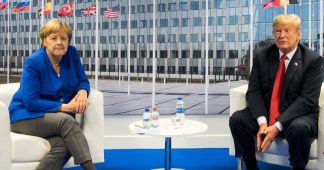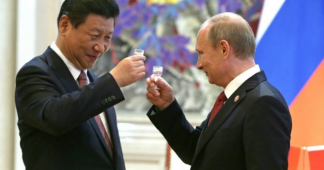5 Sep, 2019
Germany takes its own approach to relations with China and won’t bow to US demands and pressure over unrest in Hong Kong, analysts told RT, as Chancellor Angela Merkel heads to Beijing to talk trade.
Merkel arrives in China for a three-day visit on Thursday. Accompanied by a large trade delegation, she is seeking to close on the EU-China Comprehensive Agreement on Investment – but with anti-Beijing protests still raging in Hong Kong, the chancellor has been warned by the US that this is no time to do “business as usual.”
The Trump administration has been waging a trade war against China, with the president constantly slapping new tariffs on Chinese imports and declaring that China’s economy will “crumble” when he “wins.”
Policy not dictated by US or Hong Kong protesters
It’s all in an apparent effort to drive a trade deal that will be “better” for Washington than Beijing – and in recent weeks the White House has tried to harness anti-China protests in Hong Kong as a means of forcing other countries into supporting its aggressive trade policies.
So far, that strategy does not seem to be bearing any fruit.
Germany’s interests should be defined by Germans alone – and should encompass the “full range” issues involved in building a relationship with another country, former VP of the OSCE Assembly Willy Wimmer told RT. This means ignoring US dictats and efforts to punish China by taking part in a potentially disastrous trade war. It also means refusing to be pressured by Hong Kong protesters.
“German interests are not expressed by people who throw Molotov cocktails in other cities around the globe.”
‘Nobody listens’ to Grenell
US Ambassador to Germany Richard Grenell – known for his frequent unwanted incursions into Germany’s internal affairs – has sought to pressure Merkel into complying with US policy on China, but Wimmer believes his intervention is unlikely to have any effect.
“Ambassador Grenell is in the unique position to be the first US ambassador to Germany who nobody listens to,” Wimmer said.
German officials have grown increasingly frustrated with Grenell’s interference in recent months. In May, Die Linke MP Klaus Ernst slammed US sanctions on Russia, saying Grenell’s threatening comments about the Nord Stream 2 gas pipeline (which Germany supports) were “simply unacceptable” and that the US ambassador was treating Germany as if it was a “US colony.” In March, another high-ranking MP called for Grenell to be expelled for acting “like a high commissioner of an occupying power” instead of an ambassador.
Europe more ‘pragmatic’ than US
As for the Hong Kong protests, Merkel will probably raise the issue during her visit, but it won’t hamper Germany’s relations with Beijing, because increased trade between the two nations will “work to the advantage of both sides,” international China specialist Andrew K.P Leung told RT.
Merkel has previously called for dialogue between all parties to defuse tensions in the region and said the freedoms enjoyed by Hong Kong’s people must be maintained.
Yet, there is “very little mileage in the European Union and Germany for America first unilateralism,” so Berlin is “unlikely to be at the US’ beck and call” when it comes to China, he said, adding that Europe does not tend to see China as the “evil empire” found in the US narrative and things are not as “black and white” for Brussels.
“Europeans are much more pragmatic and much more realistic” and they do not seek to use tariffs, military dominance and coercion to fight a rising China, Leung said.
Unlike the Trump administration in the US, Merkel is more interested in establishing a “rules-based economic order on a multilateral basis” and negotiations with China are “important to achieve this end,” Hong Kong-based political scientist Joseph Cheng told RT.
He agreed that Germany will raise human rights issues, but won’t “exert pressure” on Beijing in this way. The same can be said of Germany’s approach to other US adversaries like Russia and Iran, where Berlin also wants to engage in good relations, despite US criticisms, Cheng said.
Ultimately, Cheng said, the Hong Kong issue is not really high on the agenda of either the Trump or Merkel governments when it comes to their relationship with Beijing.
Ideally, Wimmer added, Germany’s approach “can influence a better relationship between the US and China,” which should be seen as a country that wants positive relations with its neighbors and to be a “constructive partner” on the global stage.
Published at https://www.rt.com/news/468118-germany-china-merkel-trade/











